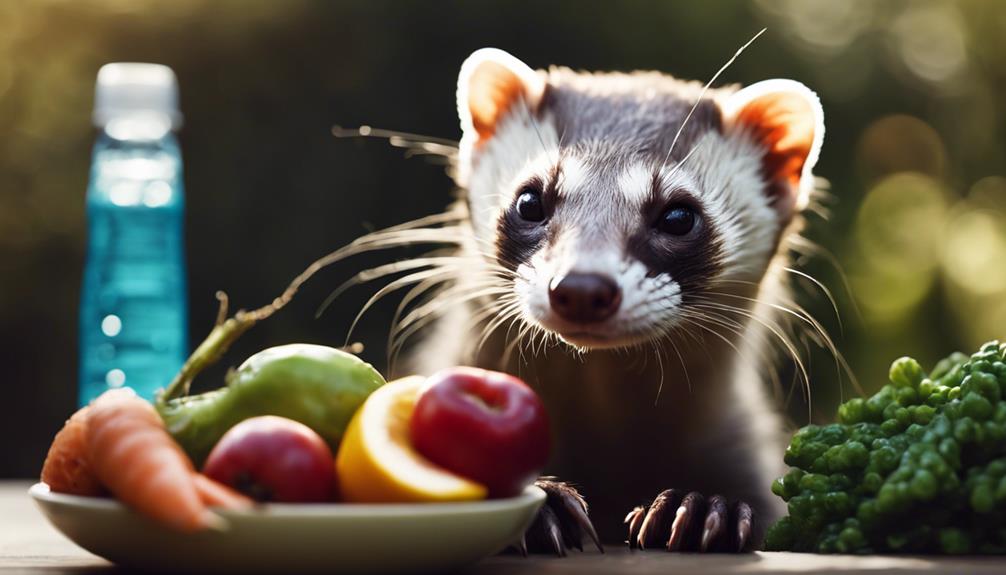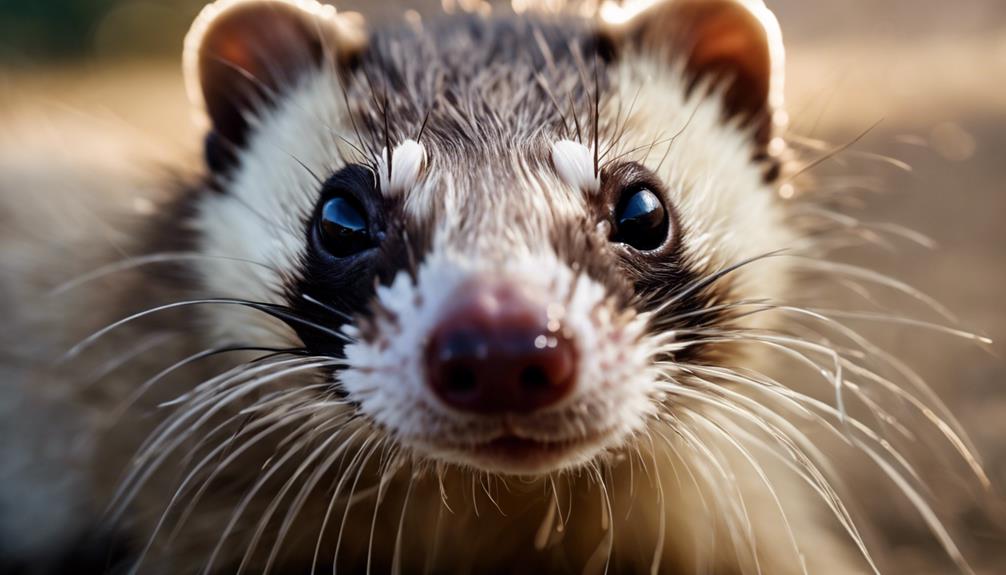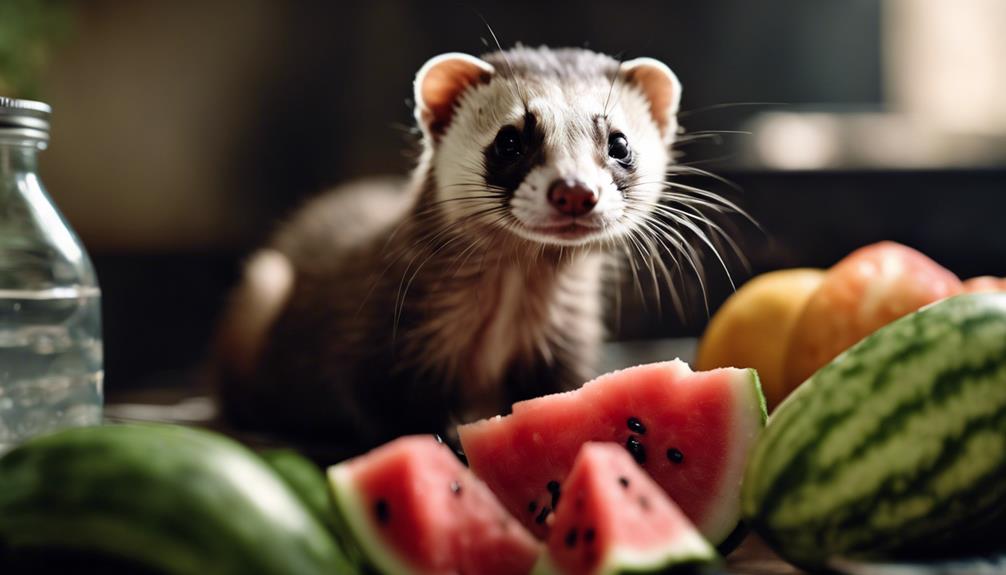Why Hydration Is Key in Ferret Nutrition

Ferrets are obligate carnivores, which means they derive most of their hydration from their food. However, providing access to fresh, clean water is crucial for their overall well-being. Water plays a vital role in digestion, nutrient absorption, and temperature regulation for ferrets. Dehydration can lead to serious health issues, so it's essential to ensure that ferrets always have access to water.
Maintaining proper hydration levels is especially important for ferrets due to their high metabolism and active nature. They may need more water during hot weather or if they are nursing or recovering from illness. As a responsible ferret owner, it's important to monitor their water intake and provide multiple sources of water throughout their living environment to encourage proper hydration.
By understanding the importance of hydration in ferret nutrition and taking proactive steps to ensure they have access to clean water at all times, you can help support your ferret's health and happiness. Remember, a well-hydrated ferret is a healthy and thriving ferret.
Importance of Hydration in Ferrets
Ensuring adequate hydration is crucial for maintaining the overall health and well-being of ferrets. Ferrets, like all animals, require water to support various physiological functions. Adequate hydration is essential for maintaining electrolyte balance, which is crucial for proper nerve and muscle function. Electrolytes, such as sodium, potassium, and chloride, play a vital role in regulating hydration levels within the body.
Additionally, proper hydration is essential for optimal urinary health in ferrets. Water intake helps to ensure that the kidneys function properly by aiding in the filtration of waste and toxins from the blood. Sufficient hydration also helps prevent urinary tract infections and the formation of urinary stones, which can be common issues in ferrets.
Therefore, providing access to fresh, clean water at all times is essential for ensuring that ferrets remain adequately hydrated. Monitoring water intake and observing for any changes in urinary habits are important steps in maintaining the health and well-being of these unique pets.
Hydration and Digestive Health

How does proper hydration impact the digestive health of ferrets? Hydration plays a crucial role in maintaining optimal digestive health in ferrets. Adequate water intake helps in the smooth movement of food through the gastrointestinal tract, aiding in proper digestion and nutrient absorption. Ferrets that are well-hydrated are less likely to suffer from issues such as constipation or gastrointestinal blockages, which can be common in dehydrated animals.
To further highlight the importance of hydration in digestive health, let's explore the relationship between hydration and behavior and hydration and exercise in ferrets:
| Aspect | Hydration and Behavior | Hydration and Exercise |
|---|---|---|
| Description | Proper hydration can positively impact a ferret's behavior, | Hydration is essential for supporting physical activities |
| promoting alertness and overall well-being. | such as play, exploration, and movement. | |
| Importance | Hydration helps maintain cognitive function and mood | Proper hydration supports muscle function and endurance |
| stability, leading to a healthier and happier ferret. | during exercise sessions. |
Hydration for Temperature Regulation

Ferrets regulate their body temperature through various mechanisms, with hydration playing a crucial role in this process. Water intake helps ferrets cool down by facilitating heat dissipation through evaporation and aiding in maintaining their thermoregulatory balance.
Understanding the relationship between hydration and temperature regulation is essential for ensuring the well-being of ferrets in different environmental conditions.
Cooling Through Water
What role does water play in aiding ferrets in regulating their body temperature effectively?
Water consumption is crucial for maintaining hydration levels in ferrets, which in turn helps them regulate their body temperature. Here are four ways water assists ferrets in cooling themselves through hydration benefits:
- Evaporative Cooling: Ferrets release heat through evaporation, similar to sweating in humans.
- Panting: Water intake supports the panting mechanism, allowing ferrets to cool down by evaporating moisture from their respiratory system.
- Heat Dissipation: Proper hydration enables ferrets to transfer heat away from their bodies more efficiently.
- Thermoregulation: Water aids in balancing body temperature, preventing overheating or hypothermia in ferrets.
Hydration and Body Heat
Water consumption by ferrets is essential for their ability to regulate body temperature effectively through hydration. Hydration plays a crucial role in maintaining normal body temperature, especially during physical activities.
When ferrets engage in exercise, they generate heat that needs to be dissipated to prevent overheating. Adequate hydration enables ferrets to sweat through their footpads and pant, facilitating heat loss and maintaining their core body temperature within a healthy range.
Additionally, proper hydration supports skin health in ferrets by ensuring adequate moisture levels for maintaining skin elasticity and preventing dryness. By staying well-hydrated, ferrets can optimize their exercise performance and promote overall well-being, making water intake a fundamental aspect of their daily care routine.
Hydration and Nutrient Absorption

Adequate hydration plays a crucial role in facilitating optimal nutrient absorption in ferrets. When ferrets are well-hydrated, their bodies can efficiently process and utilize the essential nutrients from their food.
Here are four key ways in which hydration impacts nutrient absorption in ferrets:
- Digestive Enzyme Activation: Proper hydration levels are necessary for the activation of digestive enzymes that break down food into nutrients that can be absorbed by the ferret's body.
- Transport of Nutrients: Adequate water intake helps in the transport of nutrients across the ferret's intestinal walls, ensuring that vital substances are effectively absorbed.
- Metabolic Processes: Hydration supports metabolic processes that are essential for converting nutrients into energy and building blocks for various bodily functions.
- Nutrient Utilization: Water plays a vital role in the utilization of nutrients by facilitating their distribution to cells and tissues throughout the ferret's body, promoting overall health and well-being.
Signs of Dehydration in Ferrets

Maintaining proper hydration levels is crucial for ferret owners to recognize the signs of dehydration in their pets. Dehydration prevention is essential to ensure the overall well-being of ferrets. Some common symptoms indicating dehydration in ferrets include dry, sticky gums, lethargy, sunken eyes, loss of skin elasticity, and decreased urination.
It's imperative to intervene promptly if any of these signs are observed. Implementing a structured hydration schedule can aid in preventing dehydration. Offering fresh water regularly and providing hydration-rich foods such as wet food can significantly benefit a ferret's overall health.
Hydration plays a vital role in various physiological functions, including nutrient absorption, temperature regulation, and waste elimination. By understanding the symptoms of dehydration and incorporating a proper hydration routine, ferret owners can help ensure their pets remain healthy and active. Regularly monitoring hydration status and promptly addressing any signs of dehydration are key responsibilities in caring for ferrets.
Tips to Encourage Hydration

Placing water bowls at various spots in the ferret's living area can promote frequent drinking.
Mixing water into wet food can increase overall water intake.
Providing multiple sources of water throughout the day encourages hydration in ferrets.
Water Bowl Placement
Strategic positioning of water bowls within the ferret's environment can significantly impact their daily water intake. To encourage hydration effectively, consider the following tips:
- Multiple Locations: Place water bowls in various areas of the ferret's living space to ensure easy access.
- Away from Food: Keep water bowls separate from food and litter areas to prevent contamination.
- Sturdy Base: Opt for bowls with a stable base to prevent spills and ensure continuous access to water.
- Regular Cleaning: Maintain a routine of cleaning and refilling water bowls to provide fresh, appealing water for the ferret.
Wet Food Mixing
Positioning water bowls strategically in a ferret's living space can significantly impact their hydration levels; another effective method to encourage hydration is by incorporating wet food mixing into their diet. Wet food benefits for ferrets include higher moisture content, which aids in hydration. Nutritional mixing involves blending wet food with water to create a soupy consistency that entices ferrets to consume more liquids. Below is a table showcasing some examples of wet food mixing combinations that can help increase your ferret's water intake:
| Wet Food Type | Additional Liquid | Mixing Ratio |
|---|---|---|
| Chicken | Chicken Broth | 1:1 |
| Turkey | Water | 2:1 |
| Duck | Bone Broth | 3:1 |
| Lamb | Ferret-Safe Gravy | 1:2 |
| Fish | Coconut Water | 1:3 |
Multiple Water Sources
To ensure optimal hydration levels in ferrets, providing multiple water sources throughout their living area is crucial for encouraging consistent fluid intake. Ferrets are more likely to drink water when it's easily accessible, so here are some tips to help encourage hydration:
- Water bottle options: Consider using water bottles with sipper tubes that attach to the cage, ensuring a clean water supply.
- Hydration schedule: Establish a consistent routine for offering water to your ferret, such as changing the water bottles daily and monitoring their intake.
- Strategic placement: Position water sources in different areas of the living space to make it convenient for the ferret to access water throughout the day.
- Variety: Offer water in different containers like bowls and bottles to see which option your ferret prefers for drinking.
Best Hydration Sources for Ferrets

Exploring the most effective hydration sources for ferrets involves considering their unique physiological needs and preferences. Ferrets, like other animals, require proper hydration to maintain their health and well-being. Providing various hydration sources ensures they stay hydrated and maintain electrolyte balance. Here are some of the best hydration sources for ferrets:
| Hydration Source | Benefits | Notes |
|---|---|---|
| Fresh Water | Essential for hydration and overall health | Change water daily to keep it clean and fresh |
| Wet Food | Provides moisture and nutrients | Choose high-quality wet food to support hydration |
| Water Bowls | Allows easy access to water | Use heavy bowls to prevent tipping over |
| Water Bottles | Helps maintain cleanliness | Check and clean bottles regularly |
Frequently Asked Questions
Can Ferrets Drink Flavored Water or Electrolyte Drinks for Hydration?
Ferrets should not consume flavored water or electrolyte drinks for hydration. Water is the best choice to maintain their well-being. Proper hydration is crucial for a ferret's diet, ensuring their health and vitality.
How Often Should I Change the Water in My Ferret's Bowl?
Ferrets require fresh water daily to stay hydrated. Changing the water in their bowl at least once a day ensures water quality. Place the bowl away from litter boxes and in a cool spot to maintain a suitable temperature.
Are There Any Specific Hydration Requirements for Older Ferrets?
Older ferrets have specific hydration needs due to potential health issues. Senior ferrets may benefit from hydration supplements to maintain proper fluid balance. It's essential to monitor water intake closely to ensure optimal health in aging ferrets.
Can Ferrets Overhydrate, and What Are the Risks Associated With That?
Ferrets can overhydrate, leading to health issues like water intoxication. Signs include lethargy, vomiting, and seizures. Prevent overhydration by providing fresh water in a shallow dish, monitoring intake, and ensuring a balanced diet.
Are There Any Natural Ways to Help Boost My Ferret's Hydration Levels?
Natural remedies can include adding water-rich foods like cucumbers and watermelon to a ferret's diet, providing fresh water daily, and using a water fountain to encourage drinking. Hydration tips involve monitoring water intake and ensuring access to clean water sources.











